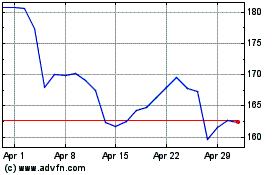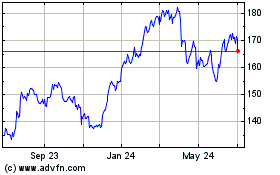By Richard Rubin and Jared S. Hopkins
This article is being republished as part of our daily
reproduction of WSJ.com articles that also appeared in the U.S.
print edition of The Wall Street Journal (August 2, 2019).
Inversions are starting to revert.
When Mylan moved its corporate address to the Netherlands in
2015, the pharmaceutical company joined a wave of corporate
inversion deals aided by tax advantages of a non-U.S. address. Now,
Mylan's address is coming back to the U.S. through a merger deal
this week with part of Pfizer Inc., a sign that the 2017 tax law is
rendering these moves less attractive than they once were.
The deal comes a month after Allergan PLC -- another inverted
pharmaceutical company, based in Dublin -- announced its return to
a U.S. parent through a sale to AbbVie Inc.
On balance, say tax lawyers and analysts, foreign addresses
still confer a slight tax advantage.
But after the U.S. corporate tax cuts in the 2017 law, the edge
is small enough that it might not be worth reputational and
political costs.
Those changes might deter new inversions and cause inverted
companies to retake U.S. addresses if other business reasons
warrant such a move. Inversion deals were particularly hot from
2012 to 2015, as companies such as Eaton Corp. and Medtronic PLC
took foreign addresses.
The moves generated political blowback as lawmakers criticized
companies as abandoning the U.S. The dust-up led to new regulations
and provided some of the impetus for the 2017 tax-code rewrite.
"Transactions that historically would have been structured as
inversions are no longer being structured that way, even when the
opportunity to do it is clearly there," said Robert Willens, a New
York tax analyst. "Before, there was such a clear economic
advantage to structuring as an inversion that you were willing to
withstand the negative aspects."
Earlier this decade, companies had strong incentives to take
non-U.S. addresses. U.S. companies owed the full 35% tax rate on
their world-wide income, though they got credits for foreign taxes
and deferred the U.S. layer until they repatriated money.
Foreign-based companies didn't face that second tax layer. And
they could use a technique called earnings stripping, loading U.S.
operations with deductible expenses and pushing profits into
lower-taxed jurisdictions.
Through mergers, companies such as Allergan, Mylan, Medtronic
and Johnson Controls PLC moved tax addresses abroad. The companies
were often managed from the U.S.
"It was always a fiction that they were foreign," said Steve
Wamhoff, director for federal tax policy at the Institute on
Taxation and Economic Policy, a liberal group critical of corporate
tax avoidance.
Obama administration regulations curbed some benefits. Then, the
2017 law cut the U.S. corporate tax rate to 21% from 35%, reducing
incentives for profit shifting and using foreign-parented
companies.
"The Trump administration's response to this whole situation was
to cut corporate taxes enough that corporations don't really need
to try that hard to avoid them," Mr. Wamhoff said.
The law also aimed at earnings stripping by adding a tax on
certain cross-border transfers within companies.
"It's too early to say definitively that the playing field is
level, but it is more level today than it was," said Bret Wells, a
law professor at the University of Houston.
Because companies changed addresses without necessarily moving
jobs or operations, inversions had limited economic effects. But
the moves reduced federal revenue and disadvantaged U.S. companies
competing against inverted firms.
In this week's deal, Pfizer's off-patent drug division will
merge with Mylan, best known for the EpiPen emergency allergy
treatment. The new, yet-unnamed company is expected to be among the
biggest sellers of generic and off-patent medicines, with more than
$19 billion in yearly sales.
Favorable corporate tax conditions resulting from the 2017 law
contributed to the decision to domicile the new company in the
U.S., according to people familiar with the merger. But an
important reason was also Delaware's attractive
corporate-governance rules for shareholders, according to Mylan and
Pfizer.
"That's a very important part of the investment thesis," Albert
Bourla, Pfizer's chief executive, said in an interview.
Analysts and investors had criticized Mylan's Dutch governance
structure. Mylan's decision to become a Dutch corporation through
an acquisition while keeping its headquarters in Pittsburgh was
seen as defensive. Afterward, Mylan engaged in a takeover battle
with rival Teva Pharmaceutical Industries Ltd. Mylan fended that
off after setting up a foundation, called a stichting in Dutch,
that triggered a Dutch variation on a poison pill.
Mylan's chairman, Robert J. Coury, told analysts this week that
governance played a greater role than tax for Mylan's exit from the
U.S. At the time of the inversion he endorsed inverting and its tax
benefits in a USA Today commentary.
Allergan referred comment to AbbVie, which said in a written
statement that remaining a U.S.-incorporated company was the most
appropriate structure for the company.
Under the new tax system, there are still benefits to a non-U.S.
address, because it can help companies avoid a new minimum tax on
U.S. companies' foreign income. Also, the parent's address is only
part of tax calculations. Some companies can still reduce U.S.
taxes by reporting profits abroad or investing in foreign
factories.
--Jonathan Rockoff contributed to this article.
Write to Richard Rubin at richard.rubin@wsj.com
(END) Dow Jones Newswires
August 02, 2019 02:47 ET (06:47 GMT)
Copyright (c) 2019 Dow Jones & Company, Inc.
AbbVie (NYSE:ABBV)
Historical Stock Chart
From Mar 2024 to Apr 2024

AbbVie (NYSE:ABBV)
Historical Stock Chart
From Apr 2023 to Apr 2024
